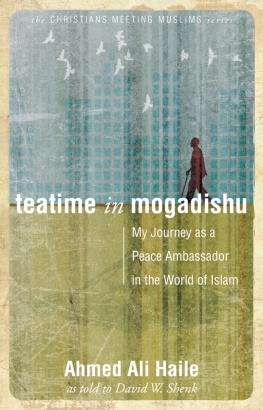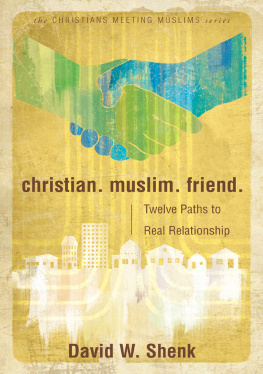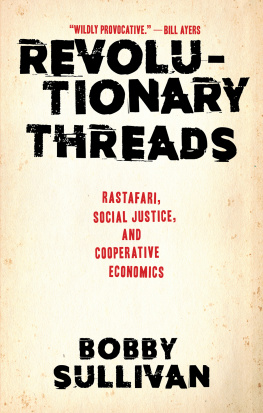teatime in mogadishu
Ahmeds discussion of traditional Somali/Islamic peacemaking and restorative justice methods raises thought-provoking questions on gospel and culture. Ahmeds passion for peace with and within Islam is of huge importance for Christian-Muslim relations.
Dr. John Azumah, Director, Centre for Islamic Studies, London (UK) School of Theology
An inspiring testimony to the tremendous impact of growing up in a loving family of faith, and of Ahmeds choice to live a Christ-centered life. Ahmed is a model of peacemaking in a pluralistic religious context.
Arli Klassen, Executive Director, Mennonite Central Committee, Akron, Pa.
This book, shared in congregational small groups and classes, will help participants understand how Jesus became the way of peace for a Muslim youth. It will also invite others to invite Jesus to guide their life decisions and to step forward with their own peacemaking initiatives.
Elizabeth G. Nissley, Pastor, James Street Mennonite Church, Lancaster, Pa.
Devotionally inspiring, missiologically instructive, and spiritually challenging. At a time when Somali and Christian seem like oxymorons in our religious vocabularies, this book is a heartening reminder that with God all things are possible.
Jonathan J. Bonk, Executive Director, Overseas Ministries Study Center, New Haven, Conn.
Ahmed Ali Hailes deep appreciation for his Muslim heritage motivated him to continue serving his people at great personal sacrifice. Faith in Jesus Christ was the reservoir of the compassion, hospitality, and witness that characterized Ahmed over four decades. His legacy will inspire and challenge.
Wilbert R. Shenk, Fuller Graduate School of Intercultural Studies, Pasadena, Calif.
A unique and powerful contribution to the great Somali tradition of storytelling. Simultaneously, it adds a compelling chapter to the contemporary Jesus story that will cheer and challenge the hearts and minds of people everywhere who long for peace and good news in a battered, desperate world.
Richard Showalter, President, Eastern Mennonite Missions, Salunga, Pa.
Ahmed Ali Haile understands the strengths of Islam and pre-Islamic traditions in his development as a Somali and as a global peacemaker. He is also very clear that Christ-centered peace activism is what brings true transformation to individuals and to the social, economic, and even political structures they create.
Barry Hart, Director, Center for Justice and Peacebuilding, Eastern Mennonite University, Harrisonburg, Va.
teatime in mogadishu
My Journey as a
Peace Ambassador
in the World of Islam
Ahmed Ali Haile
as told to David W. Shenk
The Christians Meeting Muslims series from Herald Press addresses central themes in Christian-Muslim engagement: dialogue, witness and invitation, and peacemaking. The titles in the series include A Muslim and A Christian in Dialogue by Badru D. Katerrega and David W. Shenk; Journeys of the Muslim Nation and the Christian Church: Exploring the Mission of Two Communities by David W. Shenk; and Teatime in Mogadishu: My Journey as a Peace Ambassador in the World of Islam by Ahmed Ali Haile.

Library of Congress Cataloging-in-Publication Data
Haile, Ahmed Ali.
Teatime in Mogadishu: my journey as a peace ambassador in the world
of Islam / Ahmed Ali Haile as told to David W. Shenk.
p. cm.
ISBN 978-0-8361-9557-6 (pbk.: alk. paper)
1. Haile, Ahmed Ali. 2. Christian converts from IslamSomaliaBiography. 3. Christian converts from IslamUnited StatesBiography.
4. Peace-buildingSomalia. 5. Peace-buildingReligious aspectsMen-nonites. I. Shenk, David W., 1937-II. Title.
BV2626.4.H35A3 2011
248.246092dc22
[B]
2011004734
Scripture quotations taken from the Holy Bible, New International Version Copyright 1973, 1978, 1984 by the International Bible Society. Used by permission of Zondervan Publishing House. All rights reserved.
Quran quotations are from The Holy Quran, Text, Translation, and Commentary, by Abdullah Yusuf Ali. Published (1987) by Tahrike Tarsile Quran.
Copyright 2011 by Herald Press, Harrisonburg, VA 22802
Released simultaneously in Canada by Herald Press,
Waterloo, Ont. N2L 6H7. All rights reserved
Library of Congress Control Number: 2011004734
International Standard Book Number: 978-0-8361-9557-6
Printed in the United States of America
Cover by Reuben Graham
Interior design by Gwen M. Stamm
16 15 14 13 12 11 10 9 8 7 6 5 4 3 2 1
To order or request information please call 1-800-245-7894 or visit www.heraldpress.com.
Dedicated to

My wifeMartha Jean Wilson
who has been my faithful and loving companion, encouraging me in the way of Christ and serving as counselor and partner in ministry while also being a loving mother.

Our childrenAfrahyare, Sofia, Gedi
who bless me with joy, who have deep roots in East Africa and North America, and who have invested generously in my commitments to peacemaking.

My parentsAli Haile Afrah and Hersia Shirar
who nurtured me and loved me and who planted in my soul a yearning to know and serve God faithfully.
Ahmed is a synonym for Muhammad. My parents named me Ahmed in respect for the prophet of Islam. Ahmed also means a person who is worthy of honor. Nearly five decades ago God honored me by calling me to be an emissary of the peace of Christ within the world of Islam, with a special commitment to the Somali Muslim people.
Foreword
How beautiful on the mountains are the feet of those who bring good news, who proclaim peace, who bring good tidings, who proclaim salvation.
Isaiah
A S I write, before me is todays New York Times reporting that the Shabab insurgence killed at least thirty in a hotel in Somalias capital, Mogadishu, yesterday, a day after shelling government positions and killing dozens of people. This spirit of violence is akin to the spirit of those who tried to kill Ahmed Ali Haile, the author of this memoir, over eighteen years ago, as he was seeking to reconcile fighting clans. Colleagues amputated much of his injured leg with knives to save his life. When necrotizing fasciitis started its destructive process in his leg, those who risked their lives to get him medevacked to Nairobi were the clan leaders he was seeking to reconcile.
The events that led him there started in his youth as he was raised by his upright Muslim parents; however, he chose to follow Jesus and thereby followed in the footsteps of the first recorded Muslim convert to Christianity, who was part of a migration of some of Muhammads early companions to Abyssinia. This region is referred to by Arab historians as Habash or Habasha, a designation that sometimes included not only the present land of Ethiopia but also the Horn of Africa, hence at least part if not all of present-day Somalia. Yet, unlike the first Muslim convert to Christ, who is generally understood to have gone to East Africa to avoid conflict in seventh-century Mecca, the contemporary convert Ahmed returned to the region repeatedly to mediate conflict.
Ahmeds pilgrimage has many lessons to offer in the current religious, ethnic, and clan turmoil. First, his Muslim upbringing prepared him to see its fulfillment in the gospel. He found in Islam and the local pre-Islamic cultural influence, redemptive analogies or prototypes of redemption through Christ; therefore, he never criticized his former faith.









